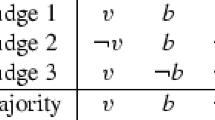Abstract
In the emerging literature on judgment aggregation over logically connected propositions, expert rights or liberal rights have not been investigated yet. A group making collective judgments may assign individual members or subgroups with expert knowledge on, or particularly affected by, certain propositions the right to determine the collective judgment on those propositions. We identify a problem that generalizes Sen’s ‘liberal paradox’. Under plausible conditions, the assignment of rights to two or more individuals or subgroups is inconsistent with the unanimity principle, whereby unanimously accepted propositions are collectively accepted. The inconsistency can be avoided if individual judgments or rights satisfy special conditions.
Similar content being viewed by others
References
Blau JH (1975) Liberal values and independence. Rev Econ Stud 42:395–402
Bovens L, Rabinowicz W (2006) Democratic answers to complex questions—an epistemic perspective. Synthese 150:131–153
Bradley R (1999) Conditional desirability. Theory Decis 47:23–55
Craven J (1982) Liberalism and individual preferences. Theory Decis 14:351–360
Deb R, Pattanaik PK, Razzolini L (1997) Game forms, rights, and the efficiency of social outcomes. J Econ Theory 72:74–95
Dietrich F (2006) Judgment aggregation: (im)possibility theorems. J Econ Theory 126(1):286–298
Dietrich F (2007a) A generalised model of judgment aggregation. Soc Choice Welf 28(4):529–565
Dietrich F (2007b) Aggregation theory and the relevance of some issues to others. Working paper, London School of Economics
Dietrich F (forthcoming) The possibility of judgment aggregation on agendas with subjunctive implications. J Econ Theory
Dietrich F, List C (2007) Arrow’s theorem in judgment aggregation. Soc Choice Welf 29(1):19–33
Dokow E, Holzman R (2005) Aggregation of binary evaluations. Working paper, Technion Israel Institute of Technology
Dowding K, van Hees M (2003) The construction of rights. Am Polit Sci Review 97:281–293
Gigliotti GA (1986) Comment on craven. Theory Decis 21:89–95
van Hees M (1999) Liberalism, efficiency, and stability: some possibility results. J Econ Theory 88:294–309
van Hees M (2004) Freedom of choice and diversity of options: some difficulties. Soc Choice Welf 22:253–266
van Hees M (2007) The limits of epistemic democracy. Soc Choice Welf 28(4):649–666
Hintikka J (1971) Some main problems of deontic logic. In: Hilpinen R (ed) Deontic logic: introductory and systematic deadings, Dordrecht (D. Reidel): pp. 59–104
Konieczny S, Pino-Perez R (2002) Merging information under constraints: a logical framework. J Logic Comput 12:773–808
Kornhauser LA, Sager LG (1986) Unpacking the court. Yale Law J 96(1):82–117
List C (2003) A possibility theorem on aggregation over multiple interconnected propositions. Math Soc Sci 45(1):1–13 (Corrigendum in Math Soc Sci 52:109–110)
List C (2004a) A model of path dependence in decisions over multiple propositions. Am Polit Sci Rev 98(3):495–513
List C (2004b) The probability of inconsistencies in complex collective decisions. Soc Choice Welf 24(1):3–32
List C, Pettit P (2002) Aggregating sets of judgments: an impossibility result. Econ Philos 18:89–110
List C, Pettit P (2004) Aggregating sets of judgments: two impossibility results compared. Synthese 140(1–2):207–235
Nehring K, Puppe C (2002) Strategy-proof social choice on single-peaked domains: possibility, impossibility and the space between. Working paper, University of California at Davies
Nehring K, Puppe C (2006) Consistent judgement aggregation: the truth-functional case. Working paper, University of Karlsruhe
Pauly M, van Hees M (2006) Logical constraints on judgment aggregation. J Philos Logic 35:569–585
Pettit P (2001) Deliberative democracy and the discursive dilemma. Philos Issues 11:268–299
Pigozzi G (2006) Belief merging and the discursive dilemma: an argument-based account to paradoxes of judgment aggregation. Synthese 152(2):285–298
Rubinstein A, Fishburn P (1986) Algebraic aggregation theory. J Econ Theory 38:63–77
Sen AK (1970) The impossibility of a paretian liberal. J Polit Econ 78:152–157
Sen AK (1976) Liberty, unanimity and rights. Economica 43:217–245
Sen AK (1983) Liberty and social choice. J Philos 80:5–28
Wagner Decew J (1981) Conditional obligation and counterfactuals. J Philos Logic 10(1):55–72
Wilson R (1975) On the theory of aggregation. J Econ Theory 10:89–99
Author information
Authors and Affiliations
Corresponding author
Additional information
Earlier versions of this paper were presented at the LGS-4 Conference in Caen, June 2005, and at the World Congress of the Econometric Society in London, August 2005. We are grateful for the comments we received at both occasions as well as from anonymous referees. Franz Dietrich acknowledges financial support from the European Commission-DG Research Sixth Framework Programme (CIT-2-CT-2004-506084 / Polarization and Conflict Project). Christian List acknowledges the hospitality of the Social and Political Theory Program, RSSS, Australian National University.
Rights and permissions
About this article
Cite this article
Dietrich, F., List, C. A liberal paradox for judgment aggregation. Soc Choice Welfare 31, 59–78 (2008). https://doi.org/10.1007/s00355-007-0263-y
Received:
Accepted:
Published:
Issue Date:
DOI: https://doi.org/10.1007/s00355-007-0263-y




